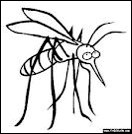Health officials are reminding Saskatchewan residents to protect themselves against mosquito bites as the risk for West Nile virus continues to increase.
The risk of contracting WNV infection usually peaks late July and in August when the mosquitoes that carry the virus, Culex tarsalis, are most active and present in higher numbers.
People are advised to take precautions when outside in areas with mosquitoes.
"Protect yourself from mosquito bites by covering up and wearing repellents or reducing the amount of time spent outdoors," Provincial West Nile Virus Coordinator Phil Curry said. "Mosquitoes can be active at any time but are most active in the evening and throughout the night."
People can also minimize exposure to mosquitoes by eliminating mosquito habitats around their homes:
Clear yards of items that can collect water;
Regularly clean and empty bird baths and eavestroughs;
Ensure rain barrels are covered with mosquito screen or are tightly sealed around the downspout;
Keep bushes, shrubs and lawns clear of overgrowth and debris; and
Make sure door and window screens fit tightly and are free of holes.
Although the vast majority of people who have been infected with WNV experience no symptoms, some people will get a mild illness (fever, headaches, body aches) and will improve on their own. A small number of people will develop a more serious illness called West Nile virus neuroinvasive disease, which includes encephalitis, an inflammation of the brain.
Symptoms of infection with WNV usually occur two to 15 days after being bitten by an infected mosquito. There may be a considerable time lag from when the risk of WNV transmission to humans is greatest to when human cases are confirmed.
"If you are concerned about your symptoms, contact your health professional or call HealthLine at 811," Saskatchewan's Deputy Chief Medical Health Officer Dr. Denise Werker said. "Seek medical attention immediately if you develop severe symptoms such as severe headaches, persistent high fever with neck stiffness, confusion, seizures or paralysis."
Recovery from WNV neuroinvasive disease may take several weeks or months, and some effects may be permanent. In some cases, this form of the disease results in death.
Updated information on WNV including risk levels and maps and surveillance results is posted every Friday before noon on www.saskatchewan.ca/westnile.
As of July 31, the risk level in the Prairie North Health Region was low. The four levels of risk are minimal, low, moderate and high.
Prince Albert Parkland Health Region's risk is minimal, while Heartland, so the south of the Battlefords, is moderate.




